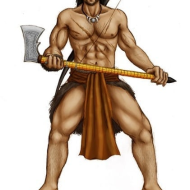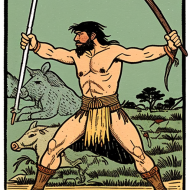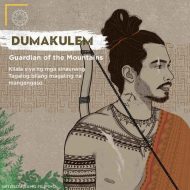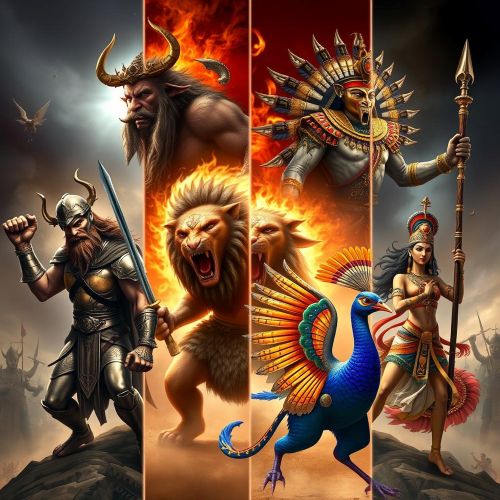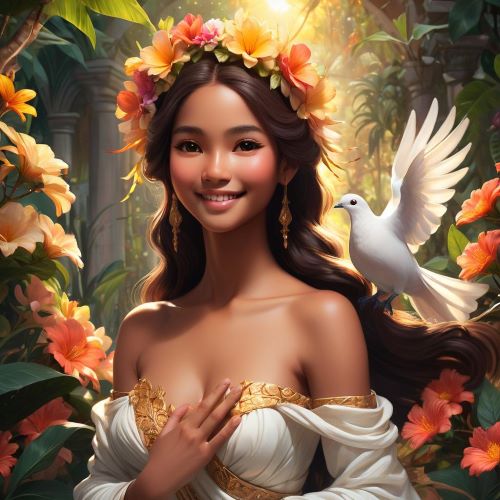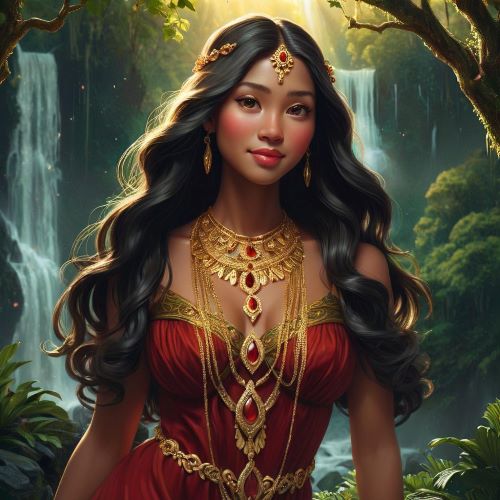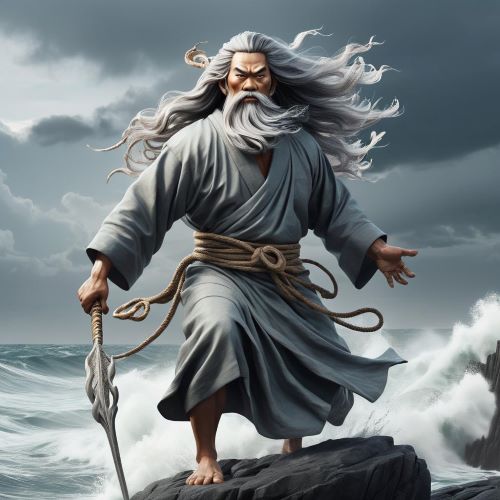Dumakulem : God of Hunting
Listen
At a glance
| Description | |
|---|---|
| Origin | Philippine Mythology |
| Classification | Gods |
| Family Members | Idianale (Mother), Dumangan (Father), Anitun Tabu (Sister), Anagolay (Wife) |
| Region | Philippines |
| Associated With | Mountains, Hunting |
Dumakulem
Introduction
Dumakulem is a deity deeply rooted in the indigenous beliefs of the Philippines. He is often depicted as a powerful and imposing figure, representing the immense strength and grandeur of the mountains. As the god of mountains, Dumakulem is responsible for safeguarding these natural wonders, ensuring their stability, and protecting the spirits that inhabit them. Known for his strength and agility, Dumakulem is revered as a god of hunting, embodying the power and majesty of nature itself.
In many indigenous communities across the Philippines, rituals and ceremonies are held to honor Dumakulem and seek his blessings. These ceremonies are often tied to planting and harvesting seasons, demonstrating the profound connection between the land and the people. Dumakulem serves as a reminder of the importance of protecting the environment, particularly the mountains. In a country prone to natural disasters, respecting the natural world and its guardian is a deeply ingrained value.
Physical Traits
Dumakulem is typically depicted as a robust and muscular figure, reflecting his association with strength and endurance. He is often portrayed holding a staff, a symbol of his authority over the mountains. His attire is simple, consisting of leaves or bark, signifying his close connection to nature. The color green is closely associated with Dumakulem, symbolizing the lush forests that often blanket the slopes of mountains. It is also a representation of renewal and growth, emphasizing the cyclical nature of life and the Earth.
Family
Dumakulem emerges from the divine union of Idianale and Dumangan, two pivotal deities within the pantheon. Anitun Tabu, the wind goddess, is Dumakulem’s sibling, solidifying his place within the celestial hierarchy. Dumakulem’s sacred matrimony to Anagolay, a prominent figure in Philippine mythology, extends his sphere of influence, representing the harmonious equilibrium among various facets of the natural world.
Other names
Dumakulem is primarily known by that name in Philippine mythology. However, due to the regional and cultural diversity within the Philippines, different indigenous groups may have their own names and variations for deities and spirits. Therefore, it’s possible that Dumakulem may be referred to by other names or titles in specific local traditions or dialects.
Powers and Abilities
Dumakulem, revered as a god of hunting among the ancient Tagalog people, was renowned as a formidable hunter. His hunting prowess transcended mere physical skill, serving as a testament to his profound connection with the natural world. He personified the primal, untamed aspects of the wilderness, and his role as a hunter-god symbolized the deep respect and reverence our ancestors held for the creatures they pursued.
However, Dumakulem’s most significant role lay in being the “guardian of created mountains.” In this capacity, he assumed the role of a protector of the natural world. Mountains, with their towering peaks and lush forests, are regarded as sacred spaces in numerous cultures, including the Philippines. As their guardian, Dumakulem was entrusted with the preservation of their sanctity.
Within the realm of Philippine mythology, Dumakulem shared associations with other deities, most notably Bathala, the supreme god, and Apo Namalyari, the god of creation. Legend has it that Bathala assigned Dumakulem the vital duty of safeguarding the mountains and ensuring their stability. Dumakulem’s divine presence permeated every peak, ridge, and valley across the archipelago, affirming his indelible connection to the land.
One of the most enduring tales concerning Dumakulem revolves around the genesis of Mount Mayon, a live volcano in the Philippines. According to local folklore, Dumakulem fell deeply in love with Magayon, a mortal woman of striking beauty. Their love was tragically forbidden, and misfortune befell Magayon, leading to her demise. In his inconsolable grief, Dumakulem shed tears of molten lava, giving rise to the fiery and majestic Mount Mayon. This legend not only accounts for the volcano’s origin but also vividly illustrates Dumakulem’s profound emotional bond with the land under his watchful care.
Moreover, Dumakulem’s influence extends into the realm of traditional healing practices, particularly those addressing injuries or maladies related to physical strength. It is believed that invoking Dumakulem’s name can facilitate the healing process, underscoring the god’s multifaceted role in the lives and well-being of the Filipino people.
Modern Day Influence
The veneration of Dumakulem finds clear expression in the burgeoning popularity of mountaineering and outdoor exploration in the Philippines. Numerous climbers and hikers pay homage to the mountain god before embarking on their journeys, invoking his protection and guidance. In various indigenous communities scattered throughout the Philippines, elaborate rituals and ceremonies are conducted to pay homage to Dumakulem and seek his benevolent blessings. These sacred observances are intricately linked with planting and harvesting seasons, serving as a poignant testament to the profound connection between the land and its people.
Dumakulem, revered as the Philippine god of mountains and strength, serves as a living testament to the Philippines’ rich and multifaceted mythology. His role as the guardian of mountains and the embodiment of strength serves as a poignant reminder of the deep-rooted bond between the Filipino populace and their natural surroundings. In an era marked by modernization and contemporary challenges, the reverence for Dumakulem and the timeless values he personifies continue to stand as an integral facet of the nation’s cultural heritage.
Related Images
Frequently Asked Questions
What is lorem Ipsum?
I am text block. Click edit button to change this text. Lorem ipsum dolor sit amet, consectetur adipiscing elit. Ut elit tellus, luctus nec ullamcorper mattis, pulvinar dapibus leo.
What is lorem Ipsum?
I am text block. Click edit button to change this text. Lorem ipsum dolor sit amet, consectetur adipiscing elit. Ut elit tellus, luctus nec ullamcorper mattis, pulvinar dapibus leo.
What is lorem Ipsum?
I am text block. Click edit button to change this text. Lorem ipsum dolor sit amet, consectetur adipiscing elit. Ut elit tellus, luctus nec ullamcorper mattis, pulvinar dapibus leo.
What is lorem Ipsum?
I am text block. Click edit button to change this text. Lorem ipsum dolor sit amet, consectetur adipiscing elit. Ut elit tellus, luctus nec ullamcorper mattis, pulvinar dapibus leo.
What is lorem Ipsum?
I am text block. Click edit button to change this text. Lorem ipsum dolor sit amet, consectetur adipiscing elit. Ut elit tellus, luctus nec ullamcorper mattis, pulvinar dapibus leo.


